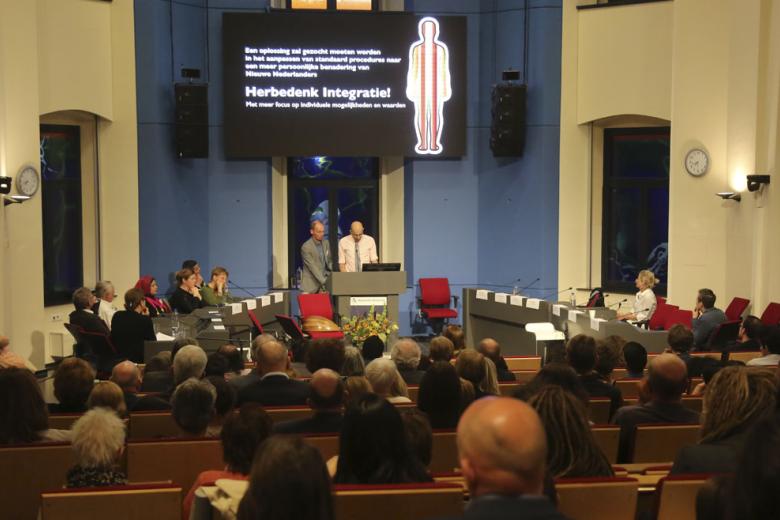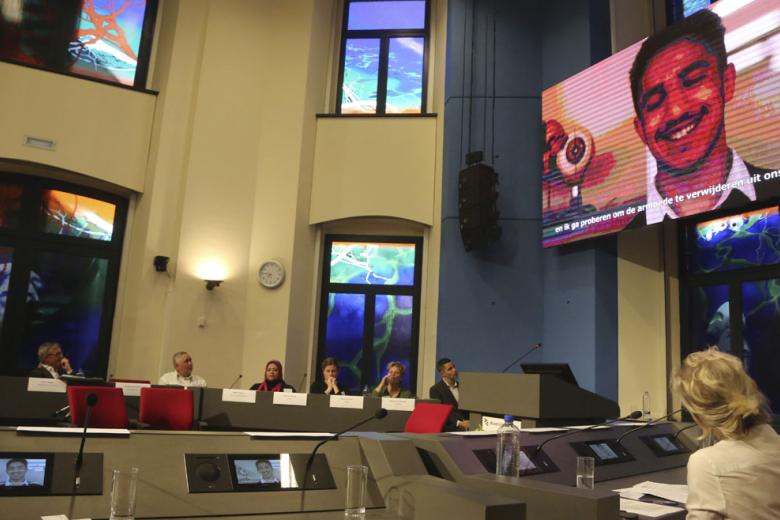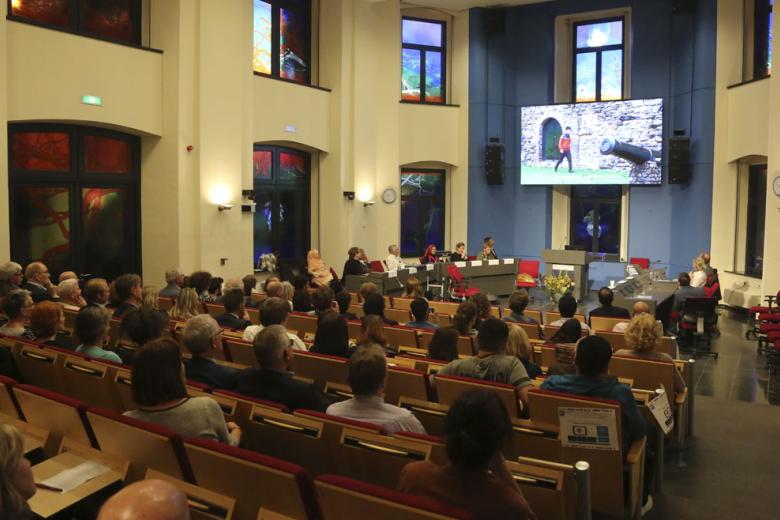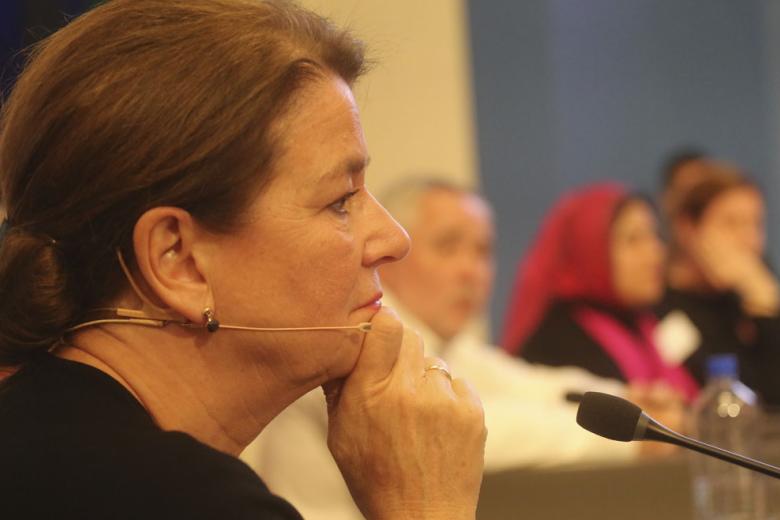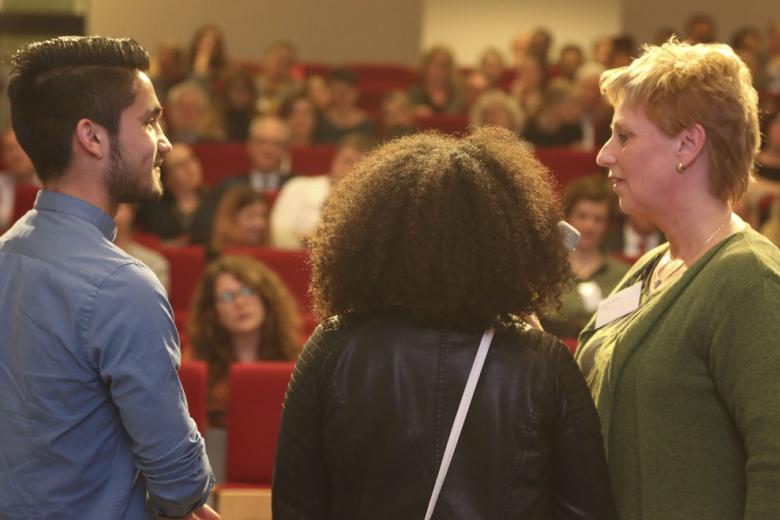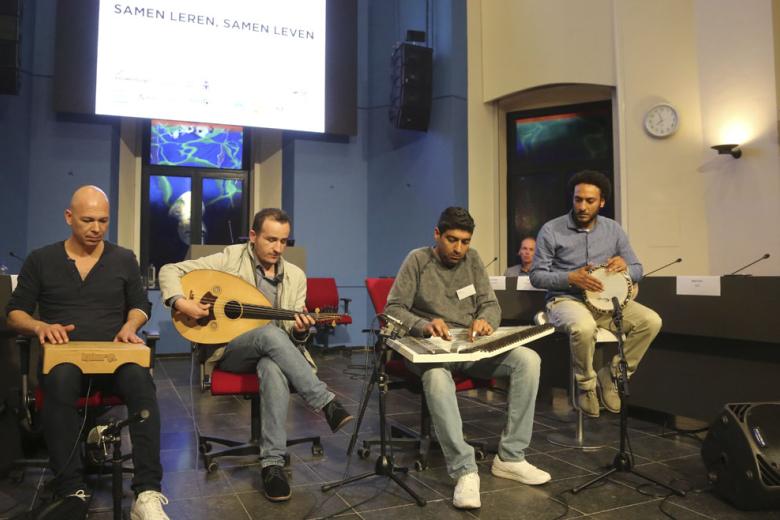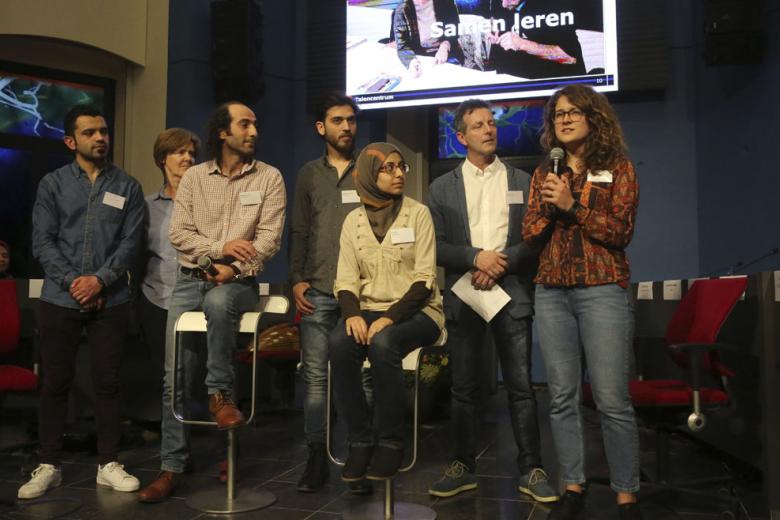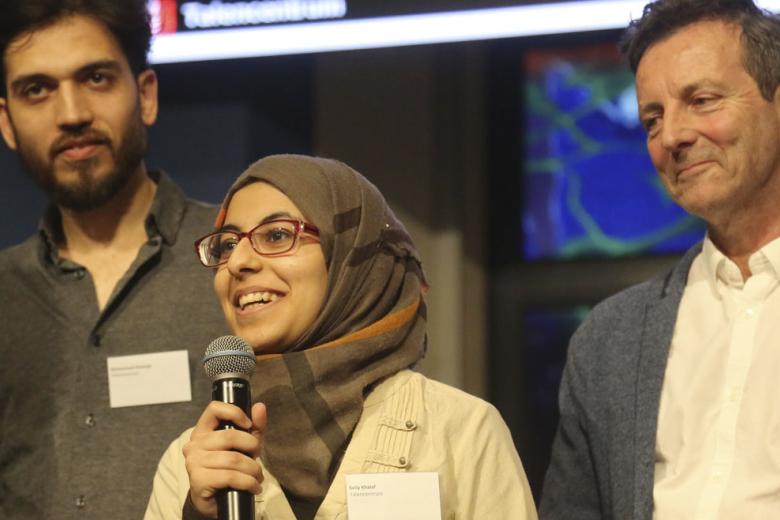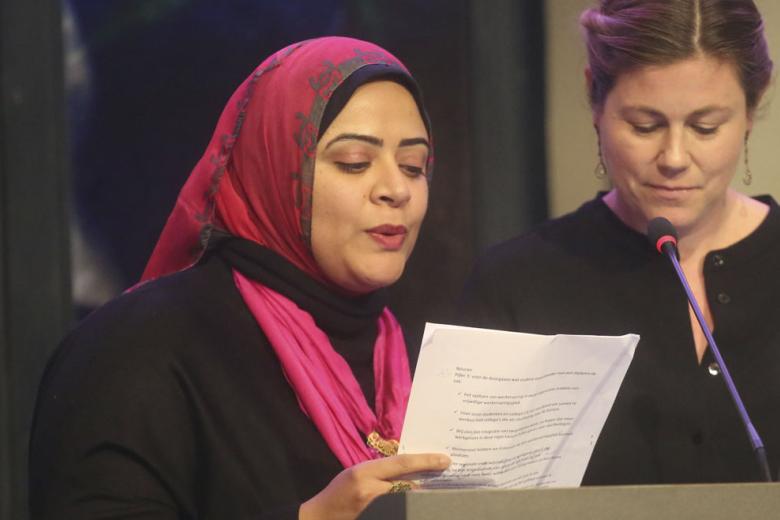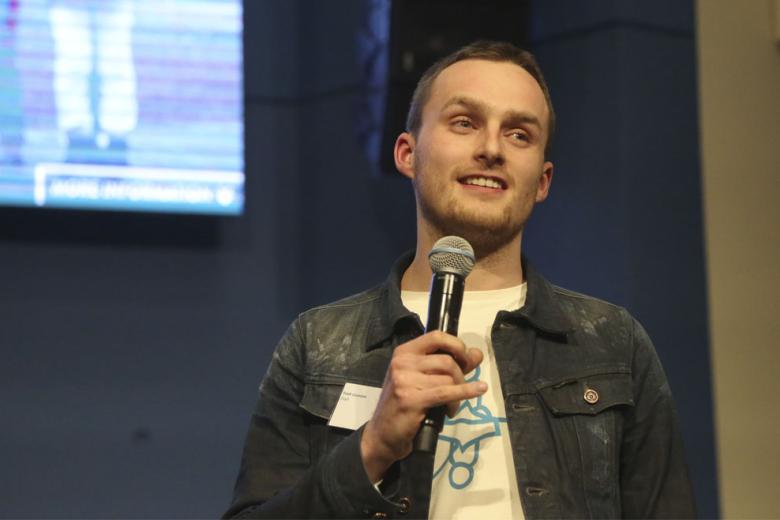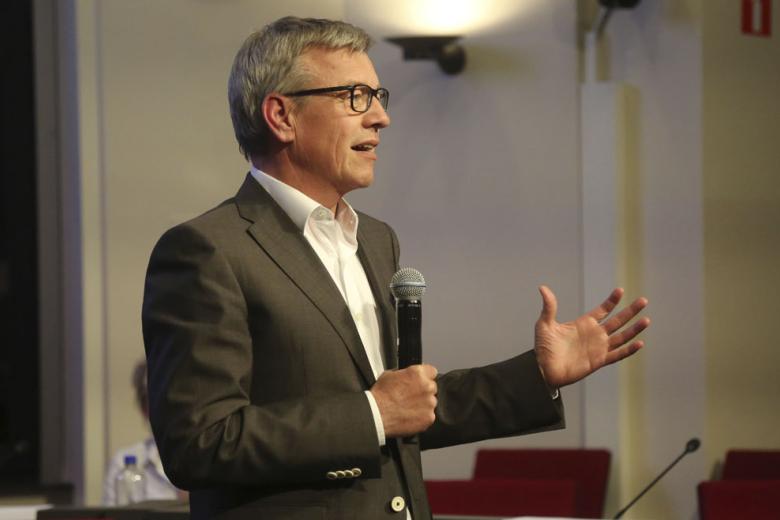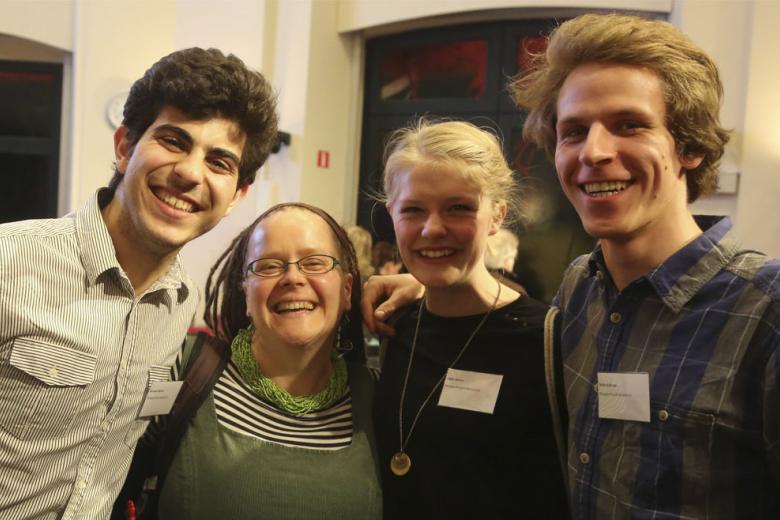Maastricht University hosts event on importance of education for refugees
On Monday evening 27 March, in a full auditorium of the Maastricht University administration building, various institutions presented the results of a unique and intensive cooperation to support the integration of refugees. Since the fall of 2015, these organisations have closely collaborated to support refugees in this region in finding suitable education. Representatives of eleven institutions gathered monthly over the past eighteen months to exchange knowledge and experiences and to contribute to the integration of newcomers in our region. Eight of these organisations shared their results and practices with the audience. The music group Oriental Nights added lustre to the evening with eastern music.
Mayor of Maastricht Annemarie Penn-te Strake moderated the event. She was welcomed in the Urdu language by a Pakistani refugee, and followed by Professor Dr Harm Hospers, vice-rector Education of Maastricht University, who spoke the same words in Dutch. The mayor opened the evening with a compliment to all participating organisations: “They have taken on a challenge that is not part of their core business and they did an excellent job. They showed that we as a city and a region have opened our doors to refugees.”
COA (the Central Agency for the Reception of Asylum Seekers) started the meeting with a presentation about the Integration Preparation programme that prepares refugees for life in the community. They do that, for example, by removing the language barrier, but also by giving attention to the expectations and dreams of the refugee. Of course, they immediately start building a network for each newcomer.
ROC Leeuwenborgh invited the audience to the world of Dutch as a Second Language (NT2) with the help of an app. All guests activated the app so they could answer twelve questions about the type of participants in the NT2 programmes, the duration and content of the tracks, the output, etc. These questions and answers turned out to be an eye opener for many in the audience, for example the fact that of the 400 persons that follow the programme at Leeuwenborgh, 80 are illiterate.
Vluchtelingenwerk (the Dutch Council for Refugees) made an appeal to rethink integration and to investigate why it often fails in the case of refugees with temporary admission. With a personal story a Syrian refugee explained the process of becoming and being a refugee and what a person experiences during this process.
Maastricht University students created a video featuring three young refugees and students in the International Transition Class, who talk about their dreams and ambitions.
The International Transition Class was represented by its team leader and two students of 18 and 16 years old. This class prepared students for the transition to secondary education. The main subject is the Dutch language, but also arithmetic, creative subjects and sports are part of the programme. Currently the school has 300 students with a very diverse background.
The Maastricht University Language Centre delivered texts and thoughts on the theme of Learning Together, Living Together. The speakers were students, teachers and a language buddy. Their message: Speak Dutch with us, include us in your conversations; integrating cannot be done on your own, you do it together.
Two enthusiastic students of the Zuyd Hogeschool programme of Communication and Multimedia Design made the interactive documentary Changetakers about three newcomers of various ages in our community.
Refugee Project Maastricht concluded the presentations and explained the work of this platform in the field of cultural exchange between refugees and citizens. They organise language (Dutch and English), music, arts, sports and social events.
Professor Harm Hospers closed the evening with a positive message “Focus on at what is possible and search for solutions. Together we can make sure that no new disappointments will be added to the experiences of these refugees. In 18 months we will gather again to share the results of our collaboration.”
The positive evening, full of atmosphere, ended with a drink and eastern dishes. Of course prepared by the newcomers in our community.
The participating institutions are:
- ROC Leeuwenborgh
- Zuyd Hogeschool
- Gemeente Maastricht
- Vluchtelingenwerk
- COA / AZC Maastricht
- InnBetween / Refugee Project Maastricht
- LVO – Internationale Schakelklas (ISK) Maastricht
- NIDOS
- Maastricht University Language Centre
- Maastricht University
Photo gallery
Video: Refugee stories
This video will give you a peek into the lives of Loai (16 years old, from Syria), Manzoor (17 years old, from Afghanistan) and Hamada (18 years old, from Syria), three young refugees living in Maastricht.
The video was produced by the study association of the master's programme in Sustainability, Science and Policy and the Maastricht Refugee Project.
Were you unable to attend, but would you still like to get an idea of what happened at this event? This video will give you a glimpse into the different performances and speeches that were given during the evening.
Relevant links
Also read
-
Andrés Caceres Solari on No room for Human Rights in Gaza and Ukraine: How the Law Legitimizes Urban Devastation
Pick Our Brains Session with Andres Caceres Solari

-
AMIBM hosts the final Realise-Bio conference
The Aachen Maastricht Institute of Biobased Materials (AMIBM) hosted last week the third and final Realise-Bio annual conference, bringing together the Dutch and German bioeconomy ecosystems at the Brightlands Chemelot Campus.

-
Macrophages as key to treating liver fibrosis
Sabine Daemen is researching how certain macrophages can slow down fatty liver disease and fibrosis in order to develop new therapies.


